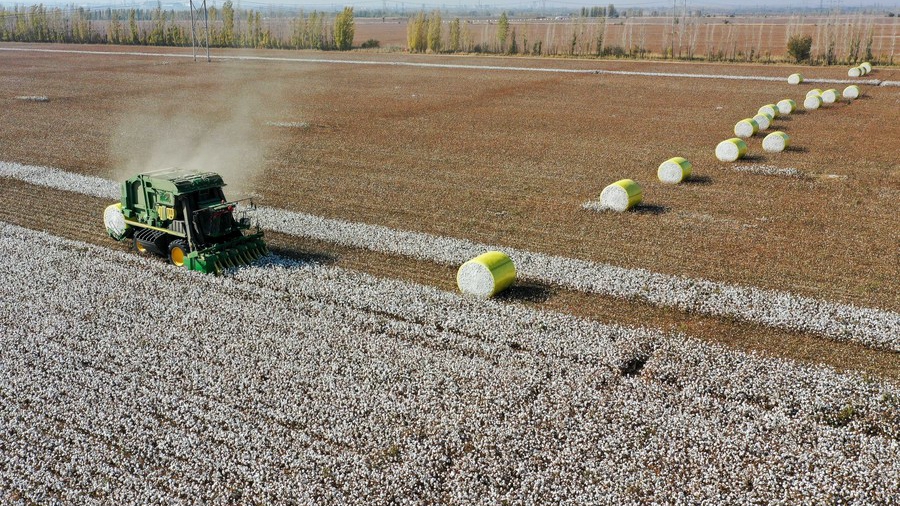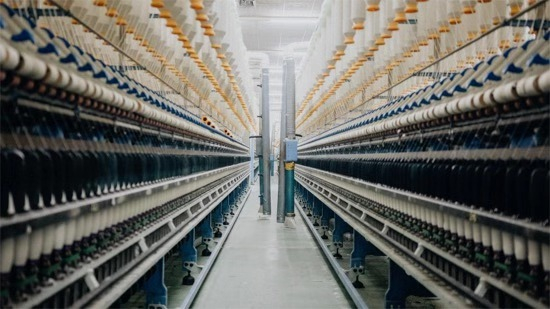
A cotton harvesting machine operating in a field in Manas County, Hui Autonomous Prefecture of Changji, northwest China's Xinjiang Uygur Autonomous Region, October 17, 2020. /Xinhua
A cotton harvesting machine operating in a field in Manas County, Hui Autonomous Prefecture of Changji, northwest China's Xinjiang Uygur Autonomous Region, October 17, 2020. /Xinhua
Editor's note: Guo Shuai is an assistant professor at China University of Political Science and Law. The article reflects the author's opinions and not necessarily the views of CGTN.
Recently, the Better Cotton Initiative (BCI), a non-profit organization and the largest international cotton sustainability program based in Switzerland, decided to suspend licensing of BCI cotton from Xinjiang Uygur Autonomous Region on the ground that farmers in Xinjiang were forced to work and such behavior breached its decent work principle.
Consequently, large international clothing manufacturing and retail corporations such as H&M, Nike and Zara started to suspend their relationship with Xinjiang cotton providers and stopped hiring Xinjiang workers. These actions have triggered a strong boycott from Chinese citizens, and Chinese celebrities have cut ties with several brands.
But what should the legal response be?
First, what are the legal status, principles and criteria of BCI? BCI is a non-governmental organization (NGO) that does not have the capacity to make international laws. Its principles and criteria, such as the six principles on decent work, are only best-practice recommendations within the industry and do not have any binding effect on sovereign states.
The effectiveness of the BCI's core values fully depends on the voluntary compliance of its members, which include civil society, producer organizations, suppliers and manufacturers, retailers and brands, as well as other associate members.
BCI members follow the organization's initiatives because of the reputation membership can bring them, that is, a brand that pursues sustainable development of cotton production, the concept of which quite appeals to Western consumers.
However, "better cotton" is evaluated on the basis of the production process, such as crop protection, water stewardship, health of the soil, biodiversity and land responsibility, fiber quality, decent work and management system, but not on the real quality of cotton. It is skeptical whether these standards are well designed.
It is also questionable whether BCI is indeed an organization that promotes international public goods, or is simply the mouthpiece of several countries. BCI's funding partners all come from Western countries such as the United States and Switzerland – thus its working mode might be biased. The process of drawing up the BCI's principles and criteria is not clear, and it is doubtful whether the interests of developing countries and emerging economies have been fully represented.

A cotton and textile factory in Awat County, Aksu Prefecture, Xinjiang Uygur Autonomous Region, China, January 5, 2020. /CGTN
A cotton and textile factory in Awat County, Aksu Prefecture, Xinjiang Uygur Autonomous Region, China, January 5, 2020. /CGTN
Second, the decision concerning Xinjiang cotton was made on the sole basis of false accusations of several Western media and politicians on Xinjiang's so-called "forced labor" issues, without sufficient evidence. No on-site investigations were conducted in Xinjiang to make such a decision. Just a few days ago, staff at BCI China based in Shanghai declared that they did not find facts to support forced labor in Xinjiang.
These contradictory behaviors between BCI's headquarters and its Shanghai office demonstrated a chaotic decision-making process within the organization, which lacks due process and does not have an appeal/hearing mechanism where affected stakeholders can voice their own interests. Such a decision is a manifest breach of the rule of law; it has the right to be heard and should be overturned.
What are the legal remedies? Farmers and companies in Xinjiang that have been affected by BCI's decisions may seek remedies on the legal basis of national tort law or their contracts, if any. However, members of BCI usually do not have bargaining powers against BCI, and they are often decision-takers but not decision-makers. It is time-consuming and cost-consuming to bring these civil suits, and the ultimate result may not be certain.
Another relevant legal basis is the Rules on Counteracting Unjustified Extra-territorial Application of Foreign Legislation and Other Measures, which was promulgated by the Ministry of Commerce in January 2021. This regulation aims to protect Chinese citizens' interests in international trade from unjustified foreign legislation and measures.
A major issue is whether the decision of BCI can be categorized as a "foreign measure" even though the decision is made by an NGO but not a sovereign state. From the text of the regulation, it does not explicitly exclude NGOs. Affected stakeholders in Xinjiang may try to file a claim accordingly.
Unfortunately, international law is silent on these transnational NGOs. The World Trade Organization (WTO) has rules on import and export restrictions, but only in terms of its members, that is, states and separate customs territories, but not NGOs. There is no formal treaty regulating the behaviors of NGOs, especially when they exploit their influence to restrain other countries' individuals and companies.
An equal level playing field is needed for fair competition in the international market. We should lead the new rule-making process towards these NGOs, whose behaviors should be supervised by competent authorities and be subject to judicial review.
(If you want to contribute and have specific expertise, please contact us at opinions@cgtn.com.)

